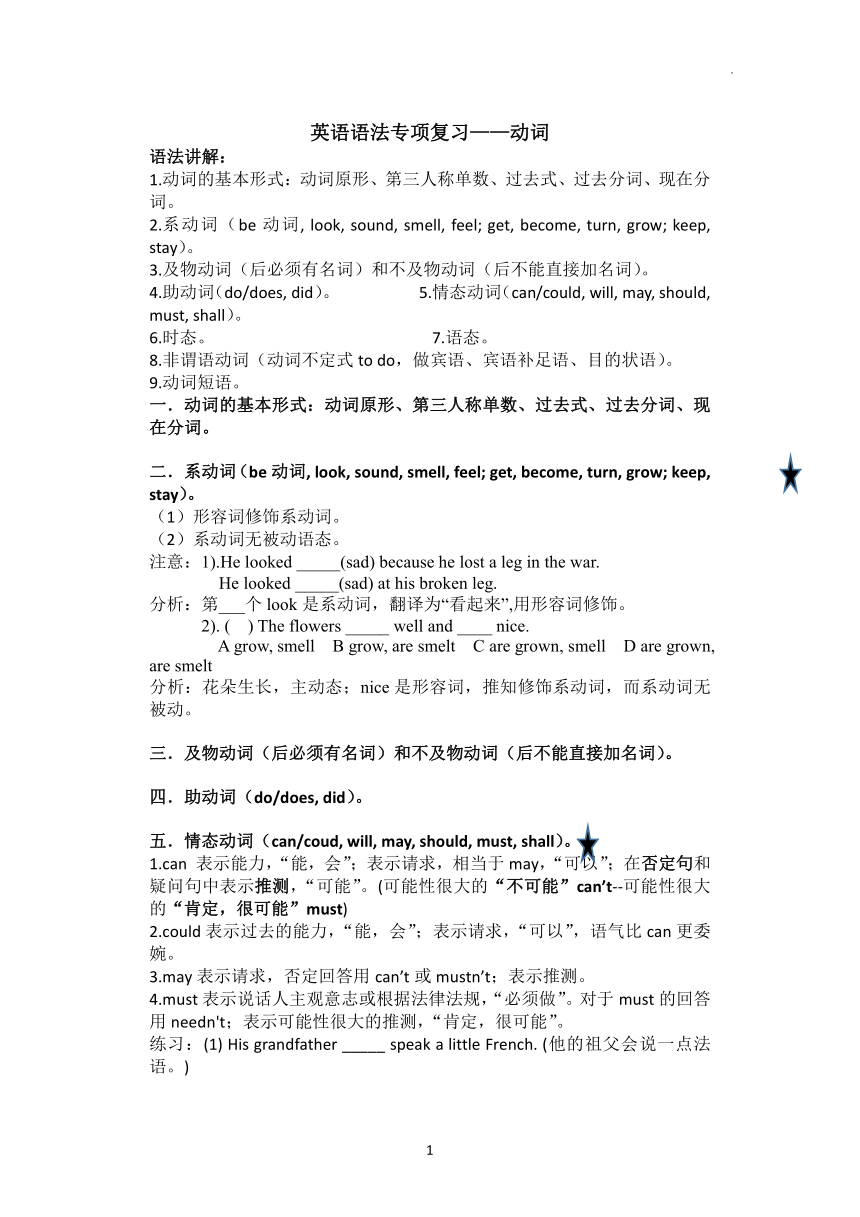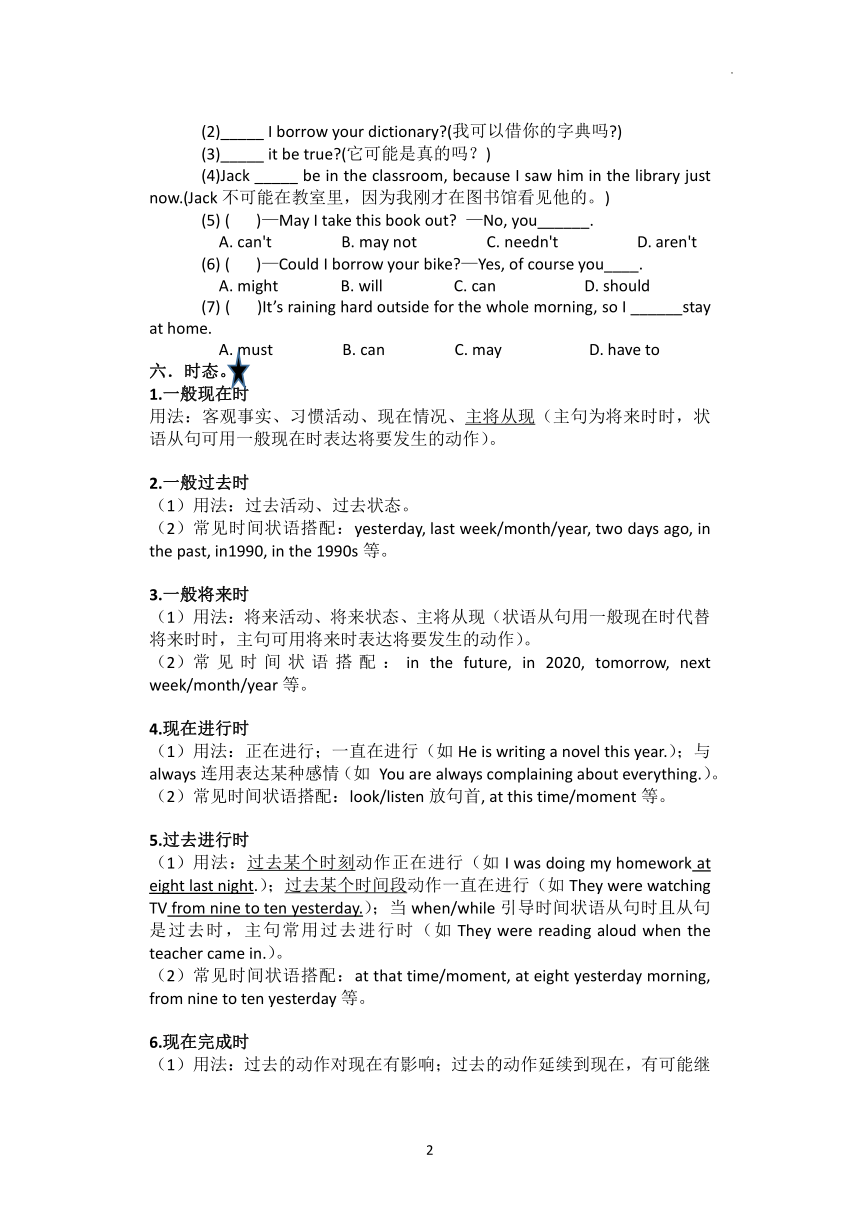2022年中考英语语法专项复习+动词(考点+真题)
文档属性
| 名称 | 2022年中考英语语法专项复习+动词(考点+真题) |  | |
| 格式 | docx | ||
| 文件大小 | 50.6KB | ||
| 资源类型 | 教案 | ||
| 版本资源 | 通用版 | ||
| 科目 | 英语 | ||
| 更新时间 | 2022-04-15 08:27:10 | ||
图片预览



文档简介
英语语法专项复习——动词
语法讲解:
动词的基本形式:动词原形、第三人称单数、过去式、过去分词、现在分词。
系动词(be动词, look, sound, smell, feel; get, become, turn, grow; keep, stay)。
及物动词(后必须有名词)和不及物动词(后不能直接加名词)。
助动词(do/does, did)。 5.情态动词(can/could, will, may, should, must, shall)。
6.时态。 7.语态。
8.非谓语动词(动词不定式to do,做宾语、宾语补足语、目的状语)。
9.动词短语。
动词的基本形式:动词原形、第三人称单数、过去式、过去分词、现在分词。
系动词(be动词, look, sound, smell, feel; get, become, turn, grow; keep, stay)。
形容词修饰系动词。
系动词无被动语态。
注意:1).He looked _____(sad) because he lost a leg in the war.
He looked _____(sad) at his broken leg.
分析:第___个look是系动词,翻译为“看起来”,用形容词修饰。
2). ( ) The flowers _____ well and ____ nice.
A grow, smell B grow, are smelt C are grown, smell D are grown, are smelt
分析:花朵生长,主动态;nice是形容词,推知修饰系动词,而系动词无被动。
及物动词(后必须有名词)和不及物动词(后不能直接加名词)。
助动词(do/does, did)。
情态动词(can/coud, will, may, should, must, shall)。
can 表示能力,“能,会”;表示请求,相当于may,“可以”;在否定句和疑问句中表示推测,“可能”。(可能性很大的“不可能”can’t--可能性很大的“肯定,很可能”must)
could表示过去的能力,“能,会”;表示请求,“可以”,语气比can更委婉。
may表示请求,否定回答用can’t或mustn’t;表示推测。
must表示说话人主观意志或根据法律法规,“必须做”。对于must的回答用needn't;表示可能性很大的推测,“肯定,很可能”。
练习:(1) His grandfather _____ speak a little French. (他的祖父会说一点法语。)
(2)_____ I borrow your dictionary (我可以借你的字典吗 )
(3)_____ it be true (它可能是真的吗?)
(4)Jack _____ be in the classroom, because I saw him in the library just now.(Jack不可能在教室里,因为我刚才在图书馆看见他的。)
(5) ( )—May I take this book out —No, you______.
A. can't B. may not C. needn't D. aren't
(6) ( )—Could I borrow your bike —Yes, of course you____.
A. might B. will C. can D. should
(7) ( )It’s raining hard outside for the whole morning, so I ______stay at home.
A. must B. can C. may D. have to
时态。
一般现在时
用法:客观事实、习惯活动、现在情况、主将从现(主句为将来时时,状语从句可用一般现在时表达将要发生的动作)。
一般过去时
用法:过去活动、过去状态。
常见时间状语搭配:yesterday, last week/month/year, two days ago, in the past, in1990, in the 1990s等。
一般将来时
用法:将来活动、将来状态、主将从现(状语从句用一般现在时代替将来时时,主句可用将来时表达将要发生的动作)。
常见时间状语搭配:in the future, in 2020, tomorrow, next week/month/year等。
现在进行时
用法:正在进行;一直在进行(如He is writing a novel this year.);与always连用表达某种感情(如 You are always complaining about everything.)。
常见时间状语搭配:look/listen放句首, at this time/moment等。
过去进行时
用法:过去某个时刻动作正在进行(如I was doing my homework at eight last night.);过去某个时间段动作一直在进行(如They were watching TV from nine to ten yesterday.);当when/while引导时间状语从句时且从句是过去时,主句常用过去进行时(如They were reading aloud when the teacher came in.)。
常见时间状语搭配:at that time/moment, at eight yesterday morning, from nine to ten yesterday等。
现在完成时
用法:过去的动作对现在有影响;过去的动作延续到现在,有可能继续延续;动作发生的次数。
常见时间状语搭配:________(至今为止),recently, in the past few years, already, yet, for+时间段, since+过去的时间点等。
有两种情况动词必须要有延续性:情况一.______________开头的现在完成时;
情况二.肯定句 + 时间段(for, since引导的时间状语)
非延续性动词 延续性动词
buy have
borrow keep
come/move here be here
go/leave be away (from)
open/close be open/be closed
begin/start be on
end/finish be over
die be dead
catch a cold have a cold
become interested in be interested in
get married/marry be married
put on wear
wake up be awake
fall asleep be asleep
join/take part in/join in be in = be a member of
leave be away from
arrive/reach/get to be at/in
make friends be friends
hear from/get /receive a letter from sb have a letter from sb
被动语态(be done)
一般现在时的被动语态__________________
一般过去时的被动语态__________________
一般将来时的被动语态__________________
非谓语动词(动词不定式做宾语、宾语补足语、目的状语)。
(一)非谓语动词在句中的成分
1.做宾语: 如 (1)He likes to play basketball. (2)I want to go fishing with you on weekends.
类似地, want, refuse, wish, need, choose, hope, agree, try, begin, offer, would like to + to do
2.做宾补: 如 (1)She asked me not to speak Chinese in an English class.
(2)I heard her cry in the next room just now.
类似地,在make, let, see, hear, watch等使役动词、感官动词后,不定式省略to。但在变为被动句时应加上to。(make/let/see/hear/watch + sb + do); tell, ask, want, allow, get, would, encourage + sb + to do。
3.做状语: 如 I went there to study English.(表目的)
(二)常见的一些与不带to的不定式连用的词组、句型:
1. Why not + do … 2. had better (not) do… 3. would rather do…
4. Could/Would/Will you please (not) do… 5.make/let/see/hear/watch + sb + do
(三)特殊疑问词+不定式
不定式可以和疑问代词(who, whom, whose what, which,) 、疑问副词(when, where, how)连用构成不定式短语,在句中作主语、宾语、表语等成分。
如 (1)Please tell me _____________next.(请告诉我接下来做什么。)
(2)I didn’t know _____________.(我不知道去哪里。)
真题演练:
1.(2021·西藏·中考真题)Some people think one of the most useful inventions ________ the smartphone.
A.are B.is C.were D.be
2.(2021·西藏·中考真题)His cousin is a humorous man. He makes us ________ all the time.
A.laughs B.laughing C.to laugh D.laugh
3.(2017·贵州毕节·中考真题)It’s nice to see you again. We ________ each other since 2016.
A.won’t see B.haven’t seen C.don’t see D.didn’t see
4.(2017·辽宁鞍山·中考真题)—Good morning, I’d like to buy a gift for my mother.
—How about the scarf It _________ beautiful and _________ smooth.
A.looks; feels B.sounds; feels C.feels; seems D.looks; smells
5.(2018·湖南湘西·中考真题)—What time ________ Jim usually take a shower, Rick
—He usually takes a shower at six forty.
A.do B.does C.did
6.(2018·贵州黔南·中考真题)The soup would ________ better with more salt.
A.eat B.sound C.taste D.feel
7.(2021·山东济南·中考真题)—________ swim in this river. It’s quite deep.
—Thanks for telling me.
A.No B.Not C.Don’t D.Doesn’t
8.(2021·江苏淮安·中考真题)Both Sandy and Millie ________ interested in cooking. They often learn to cook at weekends.
A.am B.is C.are D.be
9.(2017·四川广安·中考真题)The music sounds nice and the food ________ good. This hotel is so great.
A.eats B.sounds C.feels D.tastes
10.(2017·贵州六盘水·中考真题)The number of the students ________ over 2,000 in our school.
A.is B.are C.be D.were
11.(2017·山东济南·中考真题)Last night, I found a photo in an old book. It made me ________ of my primary school life.
A.think B.thinking C.thought D.to think
12.(2017·山东济南·中考真题)—________ you have an eraser, Cindy
—Yes. It’s in my pencil box.
A.Is B.Are C.Do D.Does
13.(2017·内蒙古呼和浩特·中考真题)—He doesn’t speak English or Japanese, ______
—______. He speaks Chinese.
does he; Yes, he doesn’t B.doesn’t he; No, he does
C.does he; No, he doesn’t D.does he; Yes, he does
14.(2017·内蒙古呼和浩特·中考真题)The pizza looks ______. It is my favourite.
A.lovely B.sweetly C.softly D.healthily
15.(2017·辽宁辽阳·中考真题)—The fish soup ________ so good. May I have some
—Sure.
A.feels B.sounds C.smells D.tastes
16.(2021·上海·中考真题)Your idea of a day on the beach sounds ________. Can I join you
A.lovely B.softly C.politely D.beautifully
17.(2021·江苏无锡·中考真题)一You added sugar in my tea It ________ terrible!
一Sorry, madam. I’ll pour you another cup right away.
A.feels B.looks C.sounds D.tastes
18.(2021·黑龙江牡丹江·中考真题)Fresh water ________ more important than anything else.
A.is B.are C.was
19.(2021·吉林长春·中考真题)There __________ two people waiting for you outside now.
A.is B.are C.was D.were
20.(2021·湖北鄂州·中考真题)—Would you like something to drink
—No, thanks. I ________ some tea already.
A.have drunk B.was drinking C.will drink D.drink
语法讲解:
动词的基本形式:动词原形、第三人称单数、过去式、过去分词、现在分词。
系动词(be动词, look, sound, smell, feel; get, become, turn, grow; keep, stay)。
及物动词(后必须有名词)和不及物动词(后不能直接加名词)。
助动词(do/does, did)。 5.情态动词(can/could, will, may, should, must, shall)。
6.时态。 7.语态。
8.非谓语动词(动词不定式to do,做宾语、宾语补足语、目的状语)。
9.动词短语。
动词的基本形式:动词原形、第三人称单数、过去式、过去分词、现在分词。
系动词(be动词, look, sound, smell, feel; get, become, turn, grow; keep, stay)。
形容词修饰系动词。
系动词无被动语态。
注意:1).He looked _____(sad) because he lost a leg in the war.
He looked _____(sad) at his broken leg.
分析:第___个look是系动词,翻译为“看起来”,用形容词修饰。
2). ( ) The flowers _____ well and ____ nice.
A grow, smell B grow, are smelt C are grown, smell D are grown, are smelt
分析:花朵生长,主动态;nice是形容词,推知修饰系动词,而系动词无被动。
及物动词(后必须有名词)和不及物动词(后不能直接加名词)。
助动词(do/does, did)。
情态动词(can/coud, will, may, should, must, shall)。
can 表示能力,“能,会”;表示请求,相当于may,“可以”;在否定句和疑问句中表示推测,“可能”。(可能性很大的“不可能”can’t--可能性很大的“肯定,很可能”must)
could表示过去的能力,“能,会”;表示请求,“可以”,语气比can更委婉。
may表示请求,否定回答用can’t或mustn’t;表示推测。
must表示说话人主观意志或根据法律法规,“必须做”。对于must的回答用needn't;表示可能性很大的推测,“肯定,很可能”。
练习:(1) His grandfather _____ speak a little French. (他的祖父会说一点法语。)
(2)_____ I borrow your dictionary (我可以借你的字典吗 )
(3)_____ it be true (它可能是真的吗?)
(4)Jack _____ be in the classroom, because I saw him in the library just now.(Jack不可能在教室里,因为我刚才在图书馆看见他的。)
(5) ( )—May I take this book out —No, you______.
A. can't B. may not C. needn't D. aren't
(6) ( )—Could I borrow your bike —Yes, of course you____.
A. might B. will C. can D. should
(7) ( )It’s raining hard outside for the whole morning, so I ______stay at home.
A. must B. can C. may D. have to
时态。
一般现在时
用法:客观事实、习惯活动、现在情况、主将从现(主句为将来时时,状语从句可用一般现在时表达将要发生的动作)。
一般过去时
用法:过去活动、过去状态。
常见时间状语搭配:yesterday, last week/month/year, two days ago, in the past, in1990, in the 1990s等。
一般将来时
用法:将来活动、将来状态、主将从现(状语从句用一般现在时代替将来时时,主句可用将来时表达将要发生的动作)。
常见时间状语搭配:in the future, in 2020, tomorrow, next week/month/year等。
现在进行时
用法:正在进行;一直在进行(如He is writing a novel this year.);与always连用表达某种感情(如 You are always complaining about everything.)。
常见时间状语搭配:look/listen放句首, at this time/moment等。
过去进行时
用法:过去某个时刻动作正在进行(如I was doing my homework at eight last night.);过去某个时间段动作一直在进行(如They were watching TV from nine to ten yesterday.);当when/while引导时间状语从句时且从句是过去时,主句常用过去进行时(如They were reading aloud when the teacher came in.)。
常见时间状语搭配:at that time/moment, at eight yesterday morning, from nine to ten yesterday等。
现在完成时
用法:过去的动作对现在有影响;过去的动作延续到现在,有可能继续延续;动作发生的次数。
常见时间状语搭配:________(至今为止),recently, in the past few years, already, yet, for+时间段, since+过去的时间点等。
有两种情况动词必须要有延续性:情况一.______________开头的现在完成时;
情况二.肯定句 + 时间段(for, since引导的时间状语)
非延续性动词 延续性动词
buy have
borrow keep
come/move here be here
go/leave be away (from)
open/close be open/be closed
begin/start be on
end/finish be over
die be dead
catch a cold have a cold
become interested in be interested in
get married/marry be married
put on wear
wake up be awake
fall asleep be asleep
join/take part in/join in be in = be a member of
leave be away from
arrive/reach/get to be at/in
make friends be friends
hear from/get /receive a letter from sb have a letter from sb
被动语态(be done)
一般现在时的被动语态__________________
一般过去时的被动语态__________________
一般将来时的被动语态__________________
非谓语动词(动词不定式做宾语、宾语补足语、目的状语)。
(一)非谓语动词在句中的成分
1.做宾语: 如 (1)He likes to play basketball. (2)I want to go fishing with you on weekends.
类似地, want, refuse, wish, need, choose, hope, agree, try, begin, offer, would like to + to do
2.做宾补: 如 (1)She asked me not to speak Chinese in an English class.
(2)I heard her cry in the next room just now.
类似地,在make, let, see, hear, watch等使役动词、感官动词后,不定式省略to。但在变为被动句时应加上to。(make/let/see/hear/watch + sb + do); tell, ask, want, allow, get, would, encourage + sb + to do。
3.做状语: 如 I went there to study English.(表目的)
(二)常见的一些与不带to的不定式连用的词组、句型:
1. Why not + do … 2. had better (not) do… 3. would rather do…
4. Could/Would/Will you please (not) do… 5.make/let/see/hear/watch + sb + do
(三)特殊疑问词+不定式
不定式可以和疑问代词(who, whom, whose what, which,) 、疑问副词(when, where, how)连用构成不定式短语,在句中作主语、宾语、表语等成分。
如 (1)Please tell me _____________next.(请告诉我接下来做什么。)
(2)I didn’t know _____________.(我不知道去哪里。)
真题演练:
1.(2021·西藏·中考真题)Some people think one of the most useful inventions ________ the smartphone.
A.are B.is C.were D.be
2.(2021·西藏·中考真题)His cousin is a humorous man. He makes us ________ all the time.
A.laughs B.laughing C.to laugh D.laugh
3.(2017·贵州毕节·中考真题)It’s nice to see you again. We ________ each other since 2016.
A.won’t see B.haven’t seen C.don’t see D.didn’t see
4.(2017·辽宁鞍山·中考真题)—Good morning, I’d like to buy a gift for my mother.
—How about the scarf It _________ beautiful and _________ smooth.
A.looks; feels B.sounds; feels C.feels; seems D.looks; smells
5.(2018·湖南湘西·中考真题)—What time ________ Jim usually take a shower, Rick
—He usually takes a shower at six forty.
A.do B.does C.did
6.(2018·贵州黔南·中考真题)The soup would ________ better with more salt.
A.eat B.sound C.taste D.feel
7.(2021·山东济南·中考真题)—________ swim in this river. It’s quite deep.
—Thanks for telling me.
A.No B.Not C.Don’t D.Doesn’t
8.(2021·江苏淮安·中考真题)Both Sandy and Millie ________ interested in cooking. They often learn to cook at weekends.
A.am B.is C.are D.be
9.(2017·四川广安·中考真题)The music sounds nice and the food ________ good. This hotel is so great.
A.eats B.sounds C.feels D.tastes
10.(2017·贵州六盘水·中考真题)The number of the students ________ over 2,000 in our school.
A.is B.are C.be D.were
11.(2017·山东济南·中考真题)Last night, I found a photo in an old book. It made me ________ of my primary school life.
A.think B.thinking C.thought D.to think
12.(2017·山东济南·中考真题)—________ you have an eraser, Cindy
—Yes. It’s in my pencil box.
A.Is B.Are C.Do D.Does
13.(2017·内蒙古呼和浩特·中考真题)—He doesn’t speak English or Japanese, ______
—______. He speaks Chinese.
does he; Yes, he doesn’t B.doesn’t he; No, he does
C.does he; No, he doesn’t D.does he; Yes, he does
14.(2017·内蒙古呼和浩特·中考真题)The pizza looks ______. It is my favourite.
A.lovely B.sweetly C.softly D.healthily
15.(2017·辽宁辽阳·中考真题)—The fish soup ________ so good. May I have some
—Sure.
A.feels B.sounds C.smells D.tastes
16.(2021·上海·中考真题)Your idea of a day on the beach sounds ________. Can I join you
A.lovely B.softly C.politely D.beautifully
17.(2021·江苏无锡·中考真题)一You added sugar in my tea It ________ terrible!
一Sorry, madam. I’ll pour you another cup right away.
A.feels B.looks C.sounds D.tastes
18.(2021·黑龙江牡丹江·中考真题)Fresh water ________ more important than anything else.
A.is B.are C.was
19.(2021·吉林长春·中考真题)There __________ two people waiting for you outside now.
A.is B.are C.was D.were
20.(2021·湖北鄂州·中考真题)—Would you like something to drink
—No, thanks. I ________ some tea already.
A.have drunk B.was drinking C.will drink D.drink
同课章节目录
- 词法
- 名词
- 动词和动词短语
- 动词语态
- 动词时态
- 助动词和情态动词
- 非谓语动词
- 冠词
- 代词
- 数词和量词
- 形容词副词及其比较等级
- 介词和介词短语
- 连词和感叹词
- 构词法
- 相似、相近词比较
- 句法
- 陈述句
- 一般疑问句和否定疑问句
- 特殊疑问句及选择疑问句
- 反意疑问句
- 存在句(There be句型)
- 宾语从句
- 定语从句
- 状语从句
- 主谓一致问题
- 简单句
- 并列句
- 复合句
- 主谓一致
- 主、表语从句
- 名词性从句
- 直接引语和间接引语
- 虚拟语气
- 感叹句
- 强调句
- 倒装句
- 祈使句
- 句子的成分
- 句子的分类
- 题型专区
- 单项选择部分
- 易错题
- 完形填空
- 阅读理解
- 词汇练习
- 听说训练
- 句型转换
- 补全对话
- 短文改错
- 翻译
- 书面表达
- 任务型阅读
- 语法填空
- 其他资料
